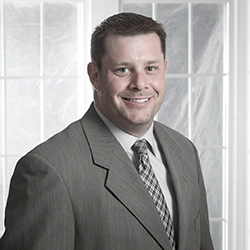Yesterday I featured West River attorney Mark Vargo’s opposition to Amendment S; today I spotlight East River attorney Ryan Kolbeck’s opposition to Amendment S. How’s that for fair and balanced?

Kolbeck has spoken out against Amendment S on behalf of the South Dakota State Bar Association since June, when the lawyers’ group gave the crime victims bill of rights its near-unanimous condemnation at its annual convention. Kolbeck explains further to KSOO that Amendment S would increase court costs by 30% without adding any necessary victim protections that aren’t already provided.
Kolbeck also raises an argument that has made me suspicious about Amendment S since Republican political operative Jason Glodt first floated it last summer—no victims rights groups in South Dakota are asking for it:
If there are changes needed, we should go to Pierre. The victim’s rights groups should be knocking down the door saying that we need more rights. (Currently) no one is going to the County Commissions or Pierre saying that what we have is inadequate. Under the Victim’s Rights Act of 1991 or the Federal Companion Statute, these notifications to the people that really need it are already being done [Ryan Kolbeck, in Dan Peters, “South Dakota Lawyers Universally Reject Marsy’s Law Measure,” KSOO Radio, 2016.09.07].
Now I hesitate at that first sentence. Not every group seeking change needs to go to Pierre. Sometimes the Legislature can’t or won’t act in the public interest. That’s why our state constitution reserves some legislative power to the voters through initiative and referendum, so we can correct Pierre’s errors and omissions.
But if I’m a rational political actor trying to place a constitutional amendment on another state’s ballot, wouldn’t I be smarter to first approach that state’s legislature and domestic abuse advocacy groups and say, “Hey, I have an idea that might help crime victims”? If I have a good idea, shouldn’t those groups be all over my proposal? Shouldn’t legislators jump at the chance take credit for a proposal helping crime victims? Shouldn’t a few phone calls, letters, and maybe a trip or two to Pierre be able to get the Legislature to place my constitutional amendment on the ballot at a fraction of the cost of a $565,563 petition drive?
The Legislature has resisted other measures that voters have taken to the ballot via initiative, like payday lending rate caps and independent redistricting. As Kolbeck reminds us, the Legislature passed South Dakota’s current crime victims bill of rights in 1991 and has often revisited and amended that law to clarify and expand crime victims’ rights. There’s no reason to think that the Legislature would not easily pass Amendment S, if it added value to South Dakota’s existing protections for crime victims.
But Amendment S does not add value. In North Dakota, which has an identical measure on its ballot, crime victims advocates have turned against the measure for reasons identical to Kolbeck’s and Mark Vargo’s:
The North Dakota Victim Assistance Association, made up of about 50 victim advocates across the state, joined prosecutors at a press conference in Bismarck to oppose Marsy’s Law, saying it could have “reverse consequences” on victims and raising concerns that the constitutional amendment is being pushed by a California billionaire.
Association president Darla Juma of Stanley said Marsy’s Law would conflict with some of North Dakota’s current victim rights laws that are working well, and would require victims to testify in court more often.
Juma said it also would create unfunded mandates and harm victims of serious crimes by diverting victim services from those who need it most — victims of violent crimes, sex crimes and felony property crimes.
“Marsy’s Law puts a $5 bad check on the same legal footing as a rape or murder case when it comes to the victim services required, and that will bog down our court system and harm the victims who need us most,” she said.
The association — which is listed as a resource on the Marsy’s Law for North Dakota webpage — initially supported the measure but opposed it after learning more about its effects, Juma said [Mike Nowatzki, “Marsy’s Law Will ‘Harm the Victims Who Need Us Most,’ Opponents Say,” Fargo Inforum, 2016.06.23].
New laws and constitutional amendments don’t have to win the Legislature’s support. But they should have some grassroots support. As Kolbeck points out, that in-state support hasn’t materialized for Amendment S, suggesting South Dakotans see no problem with existing laws protecting crime victims. The only people cheering for Amendment S in South Dakota appear to be those who are paid to cheer.
The Justice prosecution system should not be a tool for feudal vengeance of family or tribes. Make it easier for victims and families to get remuneration for the crime in civil court.